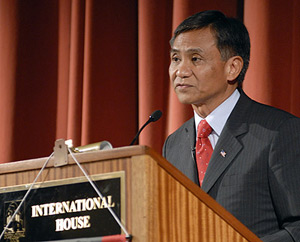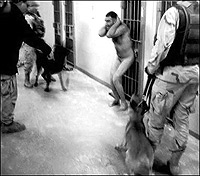Berkeleyan
General says Abu Ghraib scandal will resonate 'for years to come'
Even in retirement, Antonio Taguba, whose report on inmate abuse shed new light on the U.S. ‘war on terror,’ remains the good soldier and reluctant critic
![]()
| 13 February 2008
Major Gen. Antonio Taguba's shattering report on the Abu Ghraib scandal was released in March 2004, effectively ending America's claim to the moral high ground in its "war on terror" and making him, by all accounts, persona non grata at Donald Rumsfeld's Pentagon. Notwithstanding his singular perspective from the eye of what became an international hurricane, Taguba waited until June 2007 - nearly six months from the day he retired, under pressure, after 34 years of active duty in the U.S. Army - before giving his first interview, to New Yorker investigative reporter Seymour Hersh.
 Retired Gen. Antonio Taguba, who says he's declined moneymaking offers to write books or appear in documentaries, came to Berkeley last week to talk about human rights and the "war on terror." (Christine Jegan photo) |
Taguba, who made a rare public appearance on campus last week, never asked for that grisly, career-ending assignment. And he remains a reluctant critic of the nation he believed he was serving honorably by investigating allegations that U.S. military police had subjected inmates at the Baghdad prison to brutal and inhumane treatment. Taguba's official report concluded that MPs had inflicted "sadistic, blatant, and wanton criminal abuse" on prisoners in their custody; graphic photos, some of which were first aired by CBS News, showed GIs forcing Islamic detainees into sexually humiliating poses and threatening them with dogs.
Although his orders were to investigate no higher in the chain of command than the MP level, Taguba testified to Congress that the abuses stemmed from a "failure in leadership . . . from the brigade commander on down."
"The president," he told Hersh, "had to be aware of this."
At a time when the Iraq war still had the support of much of the U.S. electorate, the explosive revelations of abuse at Abu Ghraib - treatment Taguba found was meant to soften up prisoners for interrogation by U.S. intelligence officers - shook the military, the country, and the world. Yet if Taguba's name and face remain unfamiliar to most Americans, that's largely by design. He consented to speak at Berkeley - as he said from the stage of International House's Chevron Auditorium - only due to the persistence of Rachel Shigekane, senior program manager for the campus Human Rights Center. He declined to give interviews in advance of his talk, agreeing to a brief meeting with the Berkeleyan only after he'd left the podium.
"I choose my audiences very carefully," he explained in a small room behind the theater, where he spoke for 30 minutes and answered audience questions for another 30. "I don't do it just to appear. If it's for educational purposes, yes. If it's to inform the public, yes. Is it to gain public notoriety with a lot of interviews like what you're doing today? No. Because there's one thing that's very precious to me, and that's my privacy."
As polite and low-key one-on-one as he seems from the podium, Taguba said he's refused book and documentary-film offers. "I've turned down a lot of money," he said, rather than join the parade of government officials who have left office under a cloud of mistrust, only to write books "and tell the world that it wasn't their fault, and make millions of dollars off the backs of our soldiers..I don't want to be looked upon as an opportunist."
Taguba comes by his reticence honestly. His 89-year-old father, born, like him, in the Philippines, was captured by the Japanese in World War II and endured the Bataan Death March - later designated a war crime - before making his escape. "My father re- members the horrors of Bataan," Taguba told an audience of several hundred, "but does not speak much of them today."
Dressed in a dark suit set off with a red tie and an American-flag pin on his lapel, the slight, graying two-star general referred to notes throughout his talk, speaking haltingly and wearing a smile that seemed part pained, part bemused - even when he was asked about images of abuses at Abu Ghraib reportedly too disturbing to have been included in his full, still-classified report. He confirmed their existence, and said he believed they should remain under wraps due to their "horrific" nature.
 Dehumanizing of inmates at Abu Ghraib |
In the wake of the revelations, he said, "The negative image of the U.S. became a cliché," and American troops in Iraq were "labeled as occupiers, not liberators."
Nevertheless, "The White House continues to justify the use of torture, as recently as yesterday," he said, referring to the refusal by Attorney General Michael Mukasey and other Bush administration officials to clearly rule out the interrogation technique known as waterboarding, which critics, including many in Congress, insist is a form of torture.
Taguba cited one former administration official, Berkeley law professor John Yoo, for special mention. Yoo, who served in the Justice Department's Office of Legal Counsel from 2001 to 2003, is widely credited with - or blamed for - a series of controversial memos he wrote arguing for vastly expanded presidential powers in time of war, including those that govern the treatment of captive suspects.
Those so-called "torture memos," Taguba charged, "paved the way for the ambiguity of rules of war" and "placed our country at greater risk in fighting terrorism." It is "truly disingenuous and irresponsible," he added, for the White House to promulgate policies that contradict both national and international law - including the Geneva Conventions - and then blame abuses on "aberrant behavior" by those on the lower rungs of the chain of command.
A few soldiers received prison sentences for their roles in the Abu Ghraib scandal, but no officers or civilian leaders have been held criminally responsible. A handful, including the officer in charge of the prison, Brig. Gen. Janis Karpinski, have been demoted and reassigned.
Taguba, of course, was himself a casualty of Abu Ghraib, punished not for "aberrant behavior" but for following orders to investigate the scandal - an assignment for which he "didn't exactly raise my hand" to volunteer, but which he took more seriously, perhaps, than Washington expected. "At the end of each day, it's all about integrity," he said. If he harbors any rancor, it was not evident during his Berkeley appearance.
Even in retirement, it seems, he's still the good soldier. "You take off the uniform, but you don't shed the skin," he told the Berkeleyan.
Abu Ghraib, he added, "is a wonderful case study. You have to go back to why it happened, what precipitated it all. It's because people made the policy that said, 'Get me what I need right now, yesterday, and I don't care how you get it.'
"Soldiers are trained people," he said. "But when their leaders fail to supervise them. [civilian] authorities, who are not subject to the Uniform Code of Military Justice or any other laws, may take it upon themselves to exploit the situation."
Taguba's appearance was the first of three events in a spring colloquium, "The 'War on Terror' and Human Rights," sponsored by the Human Rights Center, the International Human Rights Law Clinic, and the Berkeley Project on Law and Terrorism. For details, visit the center's website, www.hrcberkeley.org/events.html.

